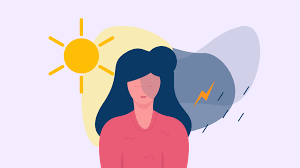Seasonal depression is a psychological disorder associated with seasonal changes, usually occurring in the fall or winter and remitting in the spring or summer. This form of depression is characterized by low mood, loss of interest, fatigue, sleep disturbance, and changes in appetite. Compared with regular depression, people with seasonal depression are more likely to experience mood disorders such as anxiety, reduced self-worth, and suicidal thoughts.
So, why does seasonal depression occur? It's not clear yet, but some research suggests it's related to a chemical imbalance in the brain, such as a decrease in neurotransmitters like serotonin. In addition, environmental factors such as reduced sunlight hours may also contribute to the development of seasonal depression.
When seasonal depression occurs, patients should seek prompt help from a mental health professional. Psychological treatments such as cognitive behavioral therapy and light therapy can help patients adjust their mentality and reduce depression. At the same time, patients can also relieve symptoms by adhering to a healthy lifestyle such as regular work and rest, healthy diet and appropriate exercise.
Although seasonal depression has a certain seasonality, its negative impact on people's mental health cannot be ignored. We should pay attention to the people around us, especially during the seasonal changes, and give them more care and support. At the same time, we must also learn to listen and understand the feelings of others and help them get out of their psychological difficulties.
In summary, seasonal depression is a common psychological disorder that may cause severe emotional distress and life impact to patients. We should correctly understand this disease and learn to actively prevent and treat it. By focusing on mental health, together we can create a healthier, better future.
Ask Dr. Scott: Does seasonal affective disorder bring you down?



